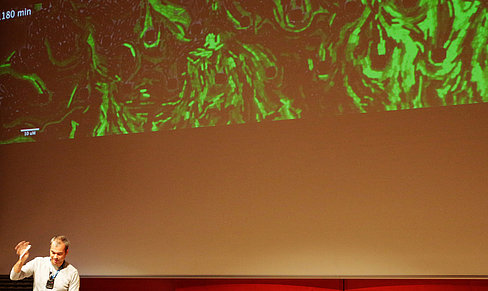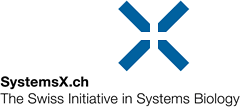All SystemsX.ch Day 2016

From basic research to applications
Around 200 researchers traveled to the Zentrum Paul Klee in Bern on September 1 to take part in the All SystemsX.ch Day 2016. Scientists from different systems biology-related disciplines took over the museum for the day, where a packed program offered talks from project leaders and a comprehensive poster exhibition.
Particularly interesting were the potential applications of the research being presented. Martin Fussenegger from ETH Zurich showed how prosthetic gene networks could be employed to induce therapeutic responses. With the help of illustrative examples, he presented possible applications of his research in the treatment of psoriasis and erectile dysfunction.

- Martin Fussenegger, ETH Zurich
At the beginning of his talk, Sebastian Maerkl from EPF Lausanne spoke about his particular love-hate relationship with cells, and raised the question of how we can sustain the production of proteins without cells. The presentation of his “repressilator” and the moving images of oscillating green proteins captivated the audience.

- Sebastian Maerkl from EPF Lausanne shows the visual results of his “repressilator”
The poster exhibition was also well received. Nearly 90 authors presented their work, answering questions and engaging in lively discussions with interested visitors throughout the two poster sessions. For the first time, lightning poster talks were also offered. Here, young researchers were given the chance to present their projects on stage. They each had only 90 seconds and a single slide with which to convince the audience to visit their posters. The aim was to explain the main points of their project simply, clearly and understandably in this short time; a great challenge, given the complexity of the projects.
There were awards for the best posters and lightning talk. The winners were Jasmin Hafner from EPF Lausanne in the PhD student category, Hartland Jackson from the University of Zurich in the postdoc category, and Atul Sethi from FMI for the best lightning talk.

- And the winners are (from left) : Hartland Jackson (UZH, postdoc 1st), Atul Sethi (FMI, best lightning talk), Julien Dorier (SIB, postdoc 3rd), Weijia Wang (ETHZ, postdoc 2nd), Jasmin Hafner (EPFL, PhD student 1st), Anush Chiappino Pepe (EPFL, PhD student 3rd). [Not pictured: Ariane Hofmann (ETHZ, PhD student, 2nd)].
At the end of the event, keynote speaker Jan Ellenberg (EMBL Heidelberg) provided a special highlight with his first-class presentation. He showed, using cell division as an example, how exciting systems biology could be, as well as how much recent technological advances had given it a development boost. Cell division, along with all of the involved proteins, can now be observed and recorded with the help of new technologies in light microscopy.
The SystemsX.ch Team would like to thank all of the speakers, presenting authors and participants for contributing to another successful All SystemsX.ch Day, and for providing a fascinating insight into the latest systems biology research and its potential applications.
Link to photo gallery: https://myalbum.com/album/v1ln5ui1Asqg
